Mould, roaches and human faeces: See inside Tasmania’s social housing horror stories
From illness-inducing mould and mildew to backyards soaked in raw sewage and roaches inside wardrobes and electrical sockets. SEE INSIDE TASSIE’S WORST HOMES >>
Tasmania
Don't miss out on the headlines from Tasmania. Followed categories will be added to My News.
From illness inducing mould and mildew to roaches, some tenants living in social housing homes have seen it all.
In some cases, public housing tenants are left to either deal with the problem themselves or live with it for extended amounts of time while they wait for solutions.
The Mercury spoke to several tenants in some of the state’s worst social housing situations – all of whom claimed they’d informed authorities of the issues that riddled their homes, but were left waiting.
The most recent data showed there were 13,909 social housing households in Tasmania, including 6961 public housing, 6641 community housing, 218 Aboriginal housing and 89 indigenous community housing.
According to the state government’s social housing policy, social housing providers are responsible for “undertaking maintenance, repairs and planned works to maintain the property and reduce deferred maintenance liability over time”.
Here are some of the Tasmania’s worst housing horror stories:
Ryan Avenue, Bridgewater
Caitlin Fitzharding-Miller told the Mercury, it wasn’t long after she’d moved into the Bridgewater home at the end of March 2018 when she started noticing some uninvited guests.
“At first I noticed a few bugs but I didn’t think much of it,” Ms Fitzharding-Miller said.
“I moved in and basically I started noticing more and more and they were cockroaches.”
The property is managed by Centrecare Evolve, but after contacting them Ms Fitzharding-Miller was left to take the situation into her own hands.
“I contacted Centrecare, they said they would look into it, I didn’t hear anything back,” she said.
“I purchased the bombs and things to get rid of them, they just kept coming back.”
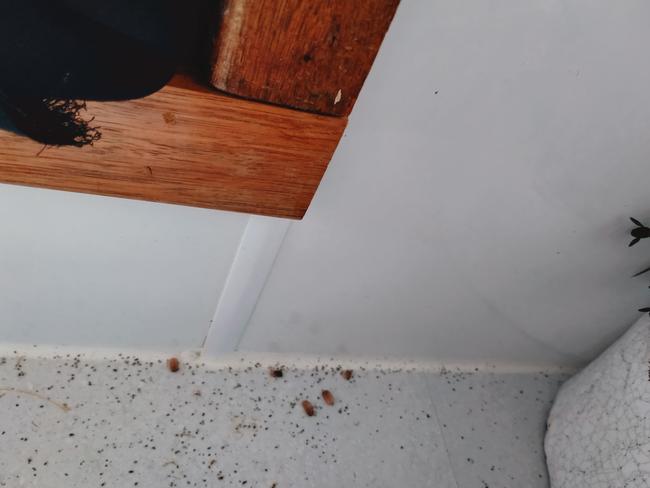
Finally, the accommodation provider fumigated the house, but the roaches were persistent.
“The house is riddled with them,” she said.
“It’s pretty horrific how bad it is, they’re inside my CPAP machine for sleep apnoea, you can see them inside of the machine.
“They’re through my clothes, they’re through everything, even my Wi-Fi box and modem.
“They’re everywhere, under my fridge and in and out of my cupboards, they are hiding in every nook and cranny.
“And they’re laying eggs.”
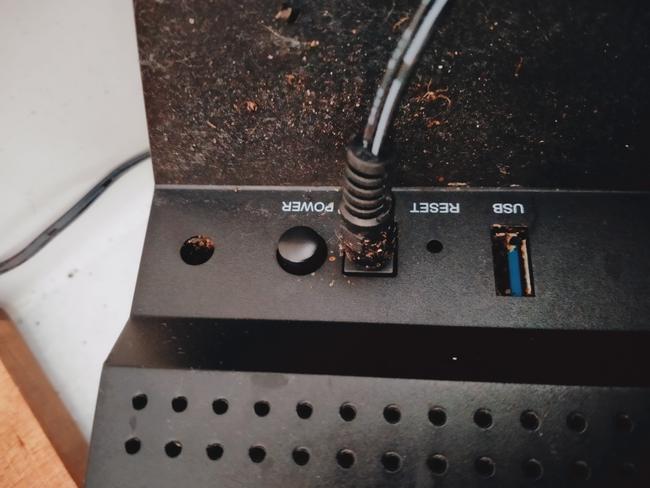
Images provided by Ms Fitzharding-Miller show small brown specks in areas of her home.
She said those specks are roach droppings, roach eggs and baby roaches.
“There are thousands of roaches,” she said.
“They crawl out everywhere, if I was to come out to my kitchen of a night and turn the light on they would all scurry everywhere.”
“There’s faeces and everything through everywhere.”
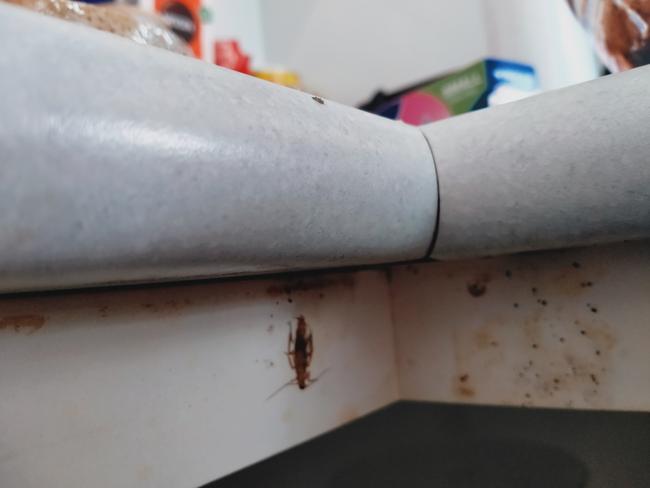
She said the situation has taken a toll on her mental health.
“It’s made me feel less of a person,” she said.
“I’m not valued as a person, we’re just basically another number and because we’re in community housing, we’re not valuable.”
It’s a situation her children have also been forced to endure.
“My children can’t have their friends over,” she said.
“I shouldn’t have to live like this, neither should my children.
“It’s made me feel filthy, I’m embarrassed.”
On top of the stress of dealing with the situation, Ms Fitzharding-Miller said she’d been sent a bill for the fumigation.
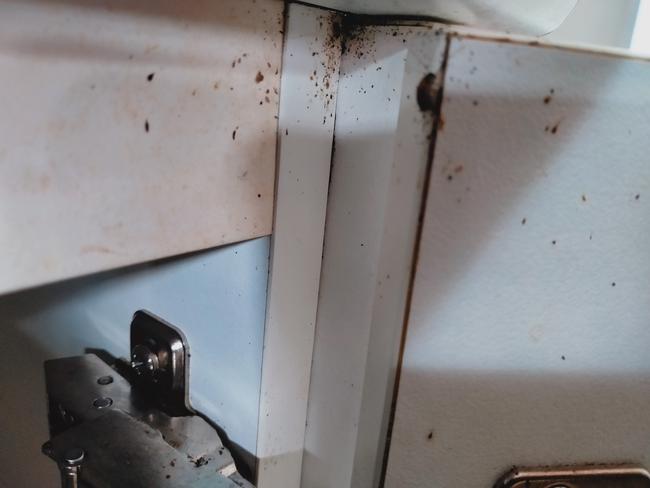
“Considering I’d reported it straight away, I don’t think it’s fair,” she said.
“I truly believe they won’t get rid of them while we’re here.”
Centacare Evolve Housing CEO Ben Wilson said six attempts had been made to fumigate the Bridgewater property between June and July this year and all were cancelled by the tenant.
“Occasionally we come across challenges with some tenants, but that doesn’t stop us wanting to help and provide them with supports – no matter what the issue,” Mr Wilson said .
“CEH has issued another work order for the property, and the tenant has agreed to proceed with further fumigation works.”
Joseph St, Rokeby
Jayne Lonergan lives in a Mission Housing home with her two children aged 14 and 16.
Before the family moved in, the home sustained fire damage.
More than a year on from the blaze, Ms Lonergan and her children noticed the effects of the blaze were still visible.
The Rokeby mother believes the repairs were inadequate.
“It’s been ongoing for a long time now, the house was burnt out over a year ago, they’ve just painted over the smoke damage,” Ms Lonergan said.
“The more time that goes by, the more black you can see on the ceiling.
“It’s just blackness, the soot coming through the paint, you can see it where all the beams are in the roof.”
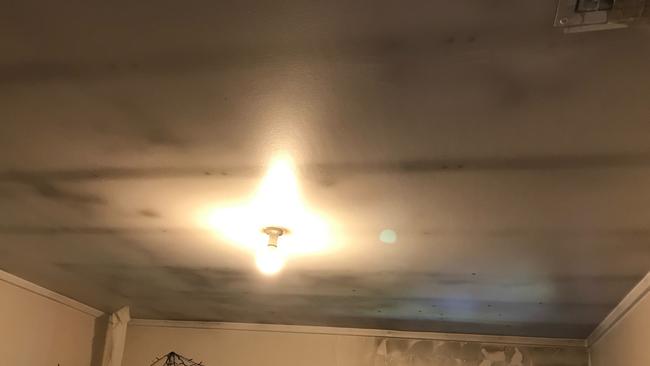
It’s not just the look of it that’s causing a problem, Ms Lonergan believes the smell is having an impact on her and her children’s health.
“We are probably breathing in some of the really bad stuff from that,” she said.
“My asthma’s gotten a lot worse, and pneumonia too, though the doctors say they can’t prove it’s from the house.
“My son gets asthma, my daughter seems okay but she’s in the worst room so long term I worry what that will do.”
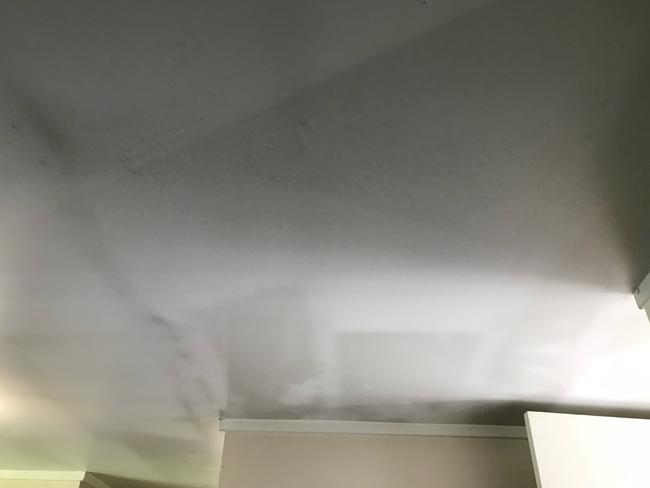
The problem has also gotten in the way of Ms Lonergan seeing her granddaughter.
“It’s made me isolated because my older kids won’t come over, they think it’s dangerous,” she said.
“I’ve got a granddaughter who is 18 months old and my daughter won’t bring her here.
She said she’d advised the housing operator of the problem but it’s yet to be solved.
“They’ve taken photos at inspections but never done anything about it,” Ms Lonergan said.
“They gave me a new kitchen but that doesn’t address the problem.
“The property manager has said he’s waiting for something from an insurance agency and that’s why it hadn’t been done.”
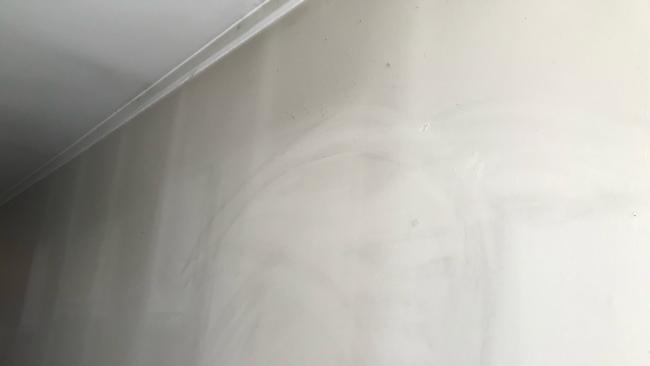
The situation has left her feeling frustrated.
“I should be able to trust them not to treat me like this, not just leave it and think we can live here because I’m poor,” Ms Lonergan said.
“I’m disgusted that they could do that and not think this could affect someone’s health.”
A spokesperson for Mission Australia said it was working to address concerns.
“Mission Australia is committed to working with all of our tenants to address maintenance issues and concerns. As always, we encourage our tenants to discuss anything with us,” the spokesperson said.
“In early November 2021, Mission Australia commenced the management transfer of nearly 700 properties, welcoming new tenants from the public housing sector.
“Over the next two years, Mission Australia’s Housing team in Tasmania will undertake an accelerated and extensive assets and maintenance program, with significant upgrades to the properties.”
Kerria Road, Risdon Vale
Risdon Vale mother Tina Cragg and two of her children have been forced to sleep in the lounge room of their public housing home because of mould damage, believed to be caused by a cracked pipe which has left under the house soggy.
The mother of four lives with her sons aged 10 and 13.
“The house, when I moved in, it was fine for three years,” Ms Cragg said.
“When that cracked pipe happened that’s when everything went to shit.”
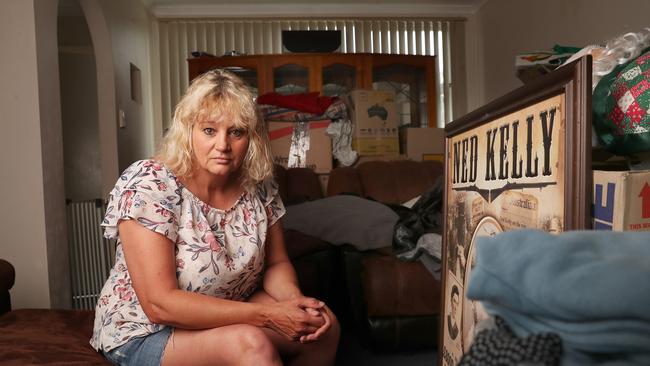
The home was a public housing property but has very recently changed hands to Mission Australia.
At the time, Ms Cragg contacted Housing Tasmania who sent someone out to inspect.
She said she was told they couldn’t find anything.
“I said my kids couldn’t play in the backyard because there was too much water,” she said.
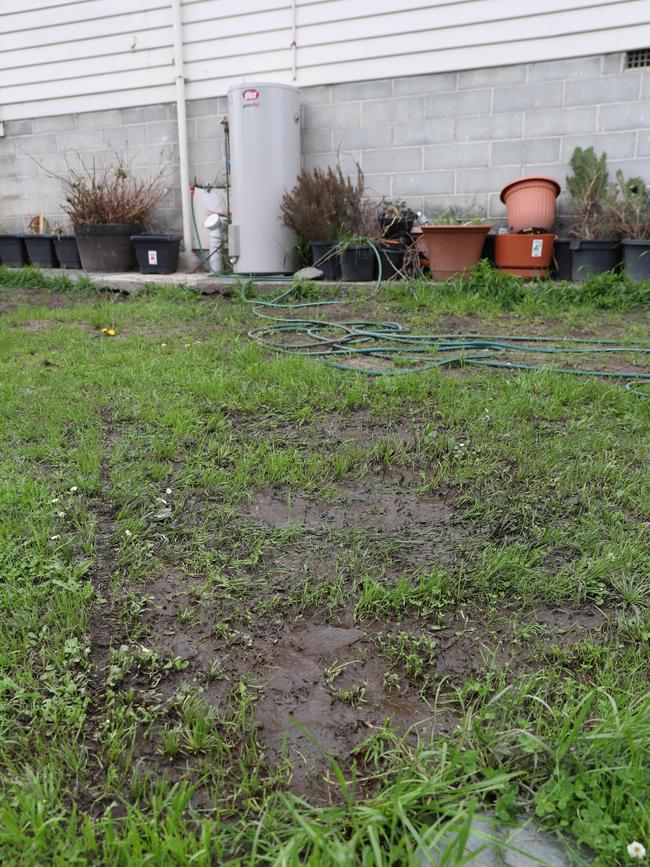
Nine months later, the problem persisted and Ms Cragg called again.
“They sent someone in, they said it’s a pretty big crack and it’s been let go for a long time,” Ms Cragg said.
“By that stage the bottom of the house was just mouldy, wet and soggy.”
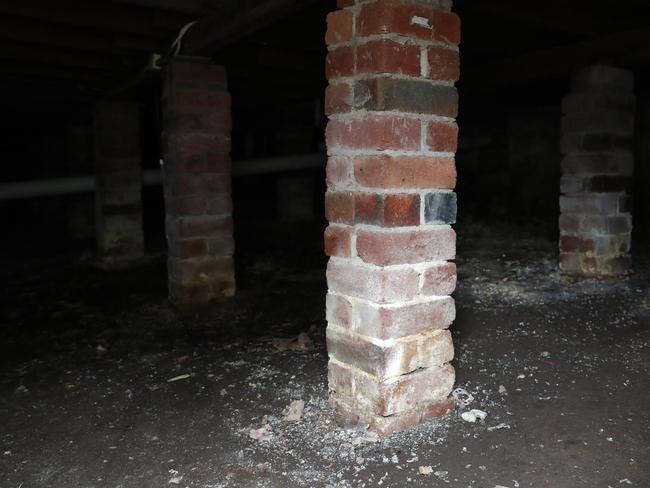
Ms Cragg said the person who inspected told her French draining needed to be installed.
She said a week later she returned home to find workers in her yard.
Ms Cragg claimed they told her the previous worker had quoted $17,000 for French draining, but the work being conducted was only $4000.
“No French draining has been done,” she said.
“They’ve cut corners, took a cheap quote and we’re the ones who lost everything.”
She said the problem still hasn’t been fixed.
“The men were sent back four times because they couldn’t get it right,” she said.
Meanwhile she said the water had caused a serious mould problem throughout the house, which has forced the family to squeeze into one room.
“We’ve still got heaps of water under the house, dampness under the house, mould all through the house,” Ms Cragg said.
“It’s gone through all our stuff.
“When you walk in the house you can just smell it.
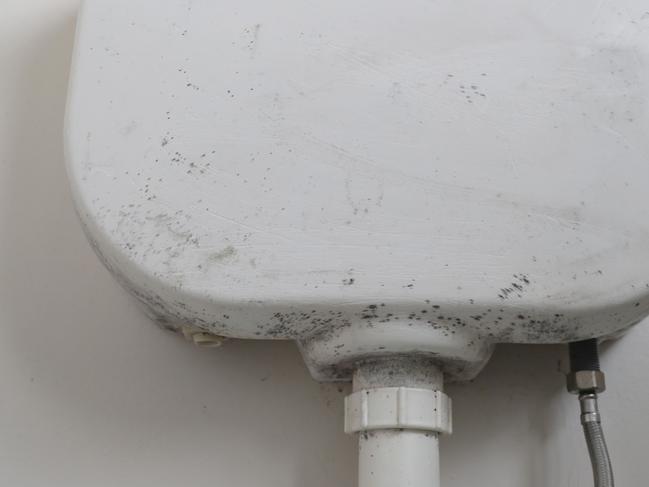
“We don’t even get to sleep in the bedrooms we have to sleep in the lounge room because when we put our heads down, all we are breathing is mould,” Ms Cragg said.
Ms Cragg said the problem has affected her mental health.
“I used to be bubbly, now all I do is get upset because I see how the boys are living, they haven’t even got a room, we pay rent and we’re stuck in the lounge room.”
Ms Cragg said she is and her sons are waiting to be transferred to a new home.
Lenah Valley Road, Lenah Valley
Lenah Valley mother of five Kirsty Patterson had been forced to deal with what many would call a horrifying situation, with the family spending weeks inundated by human faeces.
When Ms Patterson spoke to the Mercury in September, she said waste had been accumulating in the backyard of her public housing home, pipes were leaking raw sewage and the toilet would not flush.
“It was all over the kids’ pool toys, over the blow-up pool, over their plushies, their gum boots, their pool toys,” Ms Patterson told the Mercury in September.
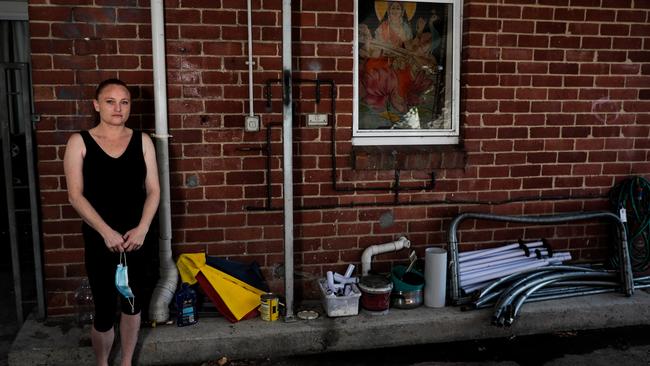
The family was forced to use a public toilet at a nearby park, and when that was closed, they forced excrement down the toilet with a plunger.
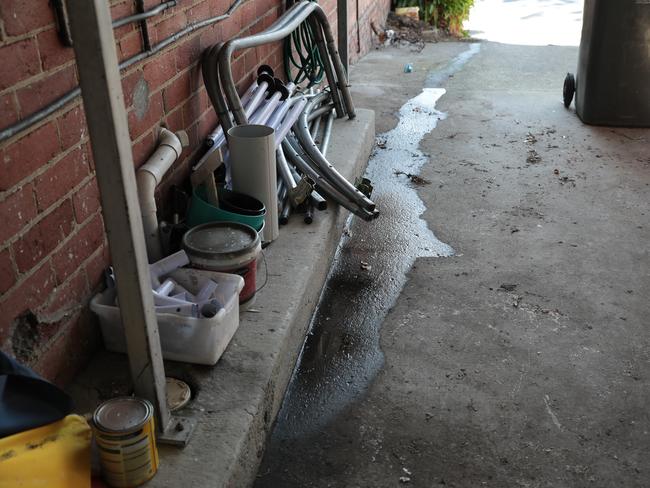
Since her interview in September, Ms Patterson said has made progress cleaning the backyard herself.
She said a pipe had been replaced but is still waiting on pipes in the bathroom to be fixed.
She said the department has dragged their heels in making repairs.
“I cleaned and suffered absolute months,” she said.
“Yes I do finally have a working toilet and no foul smells but I still have the stuff destroyed to get rid of.
“I had to clean up after everything and still have to use our kitchen sink to brush our teeth.”
Read the full story on the family struggle here.
Johnston St, Moonah
While living in her public housing home, disability pensioner Brigitte Hordern was been left fighting a seemingly unbeatable foe: mould.
Ms Hordern suffers from asthma, emphysema, chronic bronchitis and fibrosis and her doctors warned the black mould could have worsened her condition.
“Over the last two years I’ve had more chest infections, emphysema flare-ups, asthma, bronchitis issues than I have in my entire life,” she told the Mercury in October.
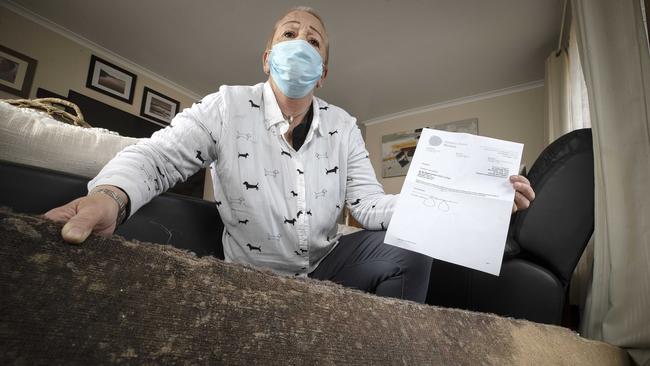
The house was deemed a health risk by doctors.
“Brigitte has a known respiratory impairment and should not remain in her home whilst the mould issue is being remedied due to risk of exposure to mould and dust exacerbating her lung condition,” a doctor’s note read.
Ms Hordern told the Mercury she’d kept her house spotless and was not to blame for the mould situation.
Since October, Ms Hordern said new carpet had been laid and the department replaced her mould ridden rug.
Read the full story here.
Minister for State Development, Construction and Housing, Michael Ferguson said the department investigating ways to help tenants get mould under control.
“Mould can arise from either structural issues or tenant actions, or a combination of both. ,” Mr Ferguson said.
“Where mould issues reported to Housing Tasmania are a result of structural issues, rectification and remedial work are undertaken as necessary.
“Tenants are regularly advised on how to better ventilate their properties to keep it dry and well aired and how to clean the property.
“Housing Tasmania provides safe and appropriate housing and encourage anyone with concerns to bring it to the attention of their housing provider so it can be promptly investigated.
“Housing Tasmania have advised me that the vast majority of complaints turn out to be avoidable cases of mould and those tenants are encouraged to rectify the issue with inexpensive and practicing cleaning products.”





